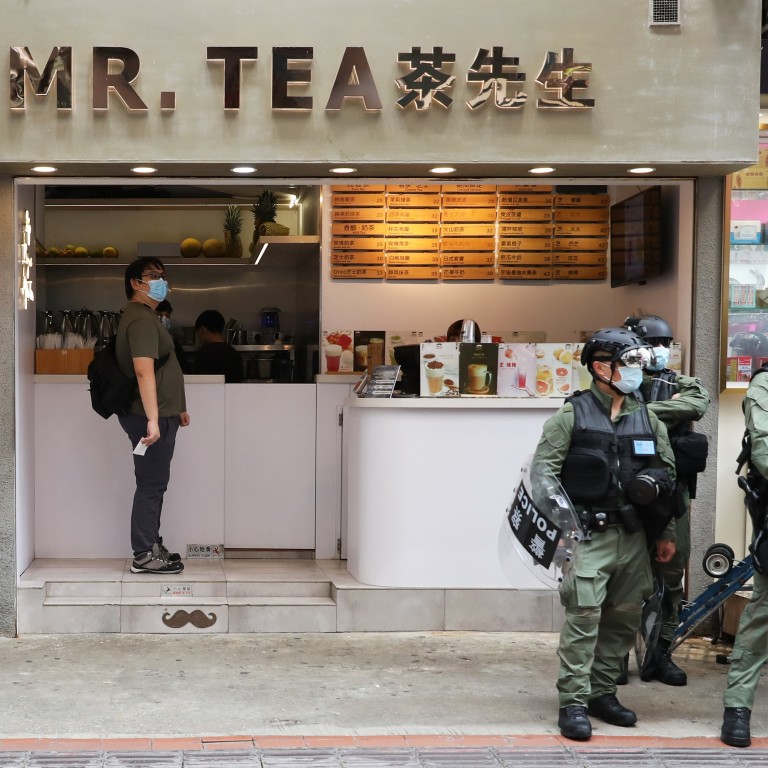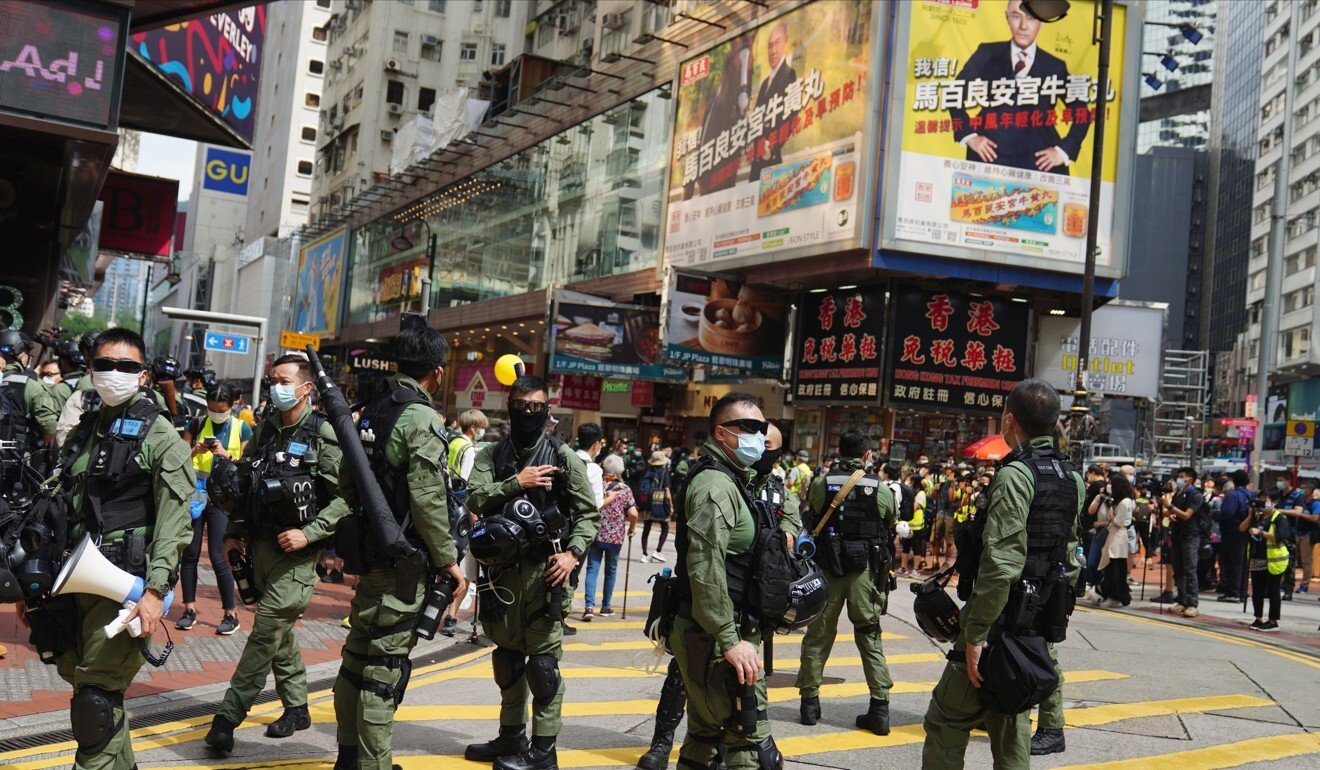
Disappointing start to ‘golden week’ for Hong Kong retailers, as protests, Covid-19 take toll
- The absence of mainland visitors and a heavy police presence make for a slow day during a usually busy time of year
- Some shoppers, however, say they are happy to skip the customary crowds
Spenders were left disappointed at a prime shopping district in Hong Kong on Thursday as stores closed their doors due to the heavy presence of police, protesters and journalists, while other normally busy areas were largely quiet at the start of the four-day long weekend.
In Causeway Bay, shoppers’ plans were disrupted after scattered groups of protesters chanted slogans and police moved in to maintain order, with some businesses forced to close early.

In the afternoon, police cordoned off a section of Paterson Street after a small group of protesters shouted slogans following netizens’ calls for people to march from East Point Road to Wan Chai. Big retailers on Paterson Street, such as fashion chain H&M and sports brand Adidas, were forced to close their outlets, while Fashion Walk, a nearby shopping centre, also shut one of its gates.
A 46-year-old lawyer who lives in Causeway Bay and gave his surname as Juam said his shopping plans were disrupted.
Initially, he had planned to buy beauty products with his wife and young son, but when they saw police blocking some roads and protesters chanting slogans, he decided to return home.
Juam said he was disappointed that his shopping had been upended, and blamed both police and protesters for causing the inconvenience.
Hong Kong adds 10 new Covid-19 cases, clamps down on rule-breaking bars, eateries
Retiree Y.T. Cheng, 66, who was shopping with his wife, said his plans were similarly disrupted, adding that he was unhappy with officers blocking the roads, forcing shoppers like him to walk back and forth.
“It’s abuse of power. They make this like a police state,” Cheng said.
An employee surnamed Cheng at Wing Kee Noodle said she knew protests could break out on Thursday.
“But I didn’t expect there would be so many riot officers,” she said.
She noted, however, that business was already down due to the pandemic, so she did not feel very strongly about officers cordoning off some areas in the area.
Still, she said, footfall on Thursday was just half of the same day last year.
Across Victoria Harbour in Tsim Sha Tsui, shopping malls did not start operations until noon, with visitors in short supply around the luxury district due to the absence of mainland customers. The police presence in the area was heavy during the afternoon at shopping malls and along the waterfront, a tourist hotspot.

Annie Liao, 13, was out spending her allowance on a pair of HK$2,000 (US$258) Valentino shoes from a luxury department store nearby.
“I prefer shopping when there’s less tourists. I’ve lived in Hong Kong for most of my life and I also get annoyed when the streets are full of people,” said Liao, whose parents were from Shenzhen.
She said the low foot traffic in Hong Kong during golden week was more likely due to the restrictions on inbound travellers rather than the calls for protests on National Day.
“If mainland Chinese travellers don’t have to go under quarantine when they cross the border, I think some would still come to Hong Kong to go shopping,” she added.
Hong Kong retail sales drop 13 per cent in August as spiral continues
Hong Kong-based data analysis firm Chain of Demand chief operating officer Wendy Choi said Hong Kong missed a golden opportunity to reopen the border for tourists for the long holiday, causing the city to miss out on a much-needed boost in tourism and spending.
“Hong Kong people like to shop, but they’re definitely not going to shop at the same consumption [level] as mainland Chinese people do,” she said, adding that locals preferred to spend money on experiences such as staycations and dining out.
“Hong Kong needs to start thinking about how they’re going to make money other than getting Chinese tourists to come to the city and continuously spend,” Choi said.
In 2018, about 1.5 million mainland Chinese travellers rushed to Hong Kong over the holiday, but that number fell by more than 55 per cent, to about 672,000 last year, with many put off by the city’s anti-government protests.
Hong Kong, Macau residents spared trips home under mainland China permit plan
This year, the coronavirus pandemic has only worsened the plunge in tourists coming to Hong Kong. Only 2.7 million mainlanders visited the city in the first eight months of the year, a 92 per cent drop from the more than 34.5 million over the same period the year before.
Liu Po-yin, general manager for the Italian brand Fila in Hong Kong, Macau and Singapore, said he expected sales in Macau would recover faster than Hong Kong, as mainland tourists could travel to the gambling hub over golden week.
“The drop in sales between the first and second quarter of this year may not be as dramatic as the fall from last year when the social movement happened,” Liu said, while noting that sales in 2020 started at a low base.
Liu said he expected in-store sales at popular shopping destinations in Hong Kong, such as Tsim Sha Tsui and Causeway Bay, to take a dip due to the lack of tourists, but was hopeful that branches in residential areas like Tuen Mun and Yuen Long would see a boost from local consumers.
To encourage locals to spend, Fila is offering freebies on purchases and deeper discounts, he added.

Simon Wong Ka-wo, president of the Hong Kong Federation of Restaurants and Related Trades, said he expected more diners to eat out at hotels and Chinese-style restaurants in shopping malls for family gatherings.
“Restaurants in areas where social unrest broke out definitely took a hit, but since it’s a long weekend, people can still reserve a table in the next few days,” Wong said.
He also noted that restaurants in residential areas like Sha Tin and Tuen Mun were booked up to 50 per cent of capacity, as required under current social-distancing measures, which he said indicated consumer appetite was gradually recovering.
Wong estimated that dining revenues could reach HK$280 million on the festive weekend, compared to some HK$400 million during the Mid-Autumn season in 2018. He said 2019 revenue was disrupted by social unrest last year.
Eateries around Tsim Sha Tsui, including Western fine dining restaurant Paper Moon in Harbour City and Sichuan-style eatery Shu K at K11 Musea, said they were still fully booked for the National Day and Mid-Autumn Festival evening on Thursday. Japanese-style hotpot restaurant Nabe Urawa at The One shopping centre only had a few tables left for the 8pm sitting, with dining time limited to under two hours to allow for turnover.


